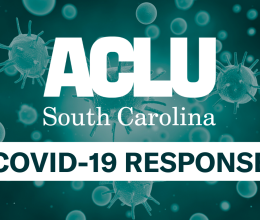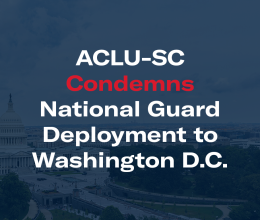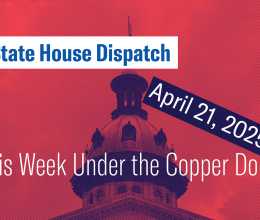
FOR IMMEDIATE RELEASE
The following statement can be attributed to Ali Titus, ACLU of South Carolina Policy and Communications Director:
South Carolina has a moral and legal obligation to protect the people it incarcerates. For weeks we have asked South Carolina officials to uphold this obligation in the face of COVID-19, including releasing those most vulnerable to contracting and dying from this virus. South Carolina officials have ignored their responsibility. The consequences are tragic and predicted. James Slater, a 70-year-old man incarcerated at Allendale Correctional Institution, died yesterday from COVID-19. To be clear, no one in custody should die in connection to abuse or neglect by the state.
Mr. Slater’s death was preventable. The rate of recidivism for people over age 65 is nearly 0%, meaning almost all incarcerated people over age 65 pose virtually no threat to public safety. Additionally, there are multiple avenues by which Mr. Slater and other incarcerated people his age or older could have been released to a safer environment ahead of a COVID-19 outbreak. The Director of the South Carolina Department of Corrections (SCDC) has the authority to petition the parole board to release people who are 70 years of age or older. During a state of emergency, the Governor has the authority to do anything necessary to keep people safe. Neither SCDC nor the Governor, we tragically learned yesterday, has upheld their duty to protect.
The virus’s ability to spread through asymptomatic carriers has been well-documented. For example, correctional institutions across the country that have issued mass testing have found that as much as 70% of the population of a single institution has tested positive for COVID-19, with a vast majority showing no symptoms at all. Therefore, testing and monitoring only those who are symptomatic is neither a solution nor a good faith effort.
It is absolutely essential that those with the authority to act do everything in their immense power to prevent future deaths from COVID-19 in correctional settings. This includes ordering mass testing of all incarcerated people and staff and substantially reducing the number of people held in South Carolina’s prisons and jails.








